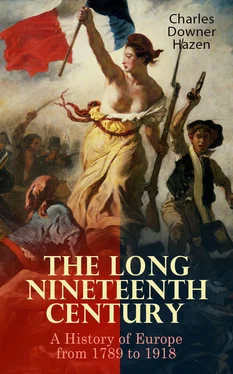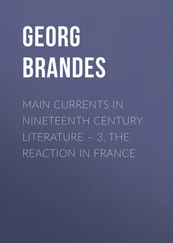The French Revolution has been frequently ascribed to the influence of the 'philosophers' or writers of the eighteenth century. This is putting the cart before the horse, not the usual or efficient way of insuring progress. The manifold ills from which the nation suffered only too palpably were the primary cause of the demand for a cure.
Nevertheless it was a fact of great importance that all the conditions described above, and many others, were criticised through the century by a group of brilliant writers, whose exposition and influence gave vocal expression on a vast scale to the discontentment, the indignation, and the longing of the age. Literature was a lusty and passionate champion of reform, and through it a flood of new ideas swept over France. Many of these ideas were of foreign origin, German, American, above all English; many were of native growth. Literature was political, and never was there such a raking criticism, from every angle, of prevalent ideas. It was skeptical and expressed the greatest contempt for the traditional that is, for the very basis on which France uneasily rested. It was analytical, and ideas and institutions and methods were subjected to the most minute and exhaustive examination. No cranny of sequestered abuse or folly was left philosophy unexplored by these eager and inquisitive and irreverent eighteenth minds, on whom the past hung lightly. Literature was optimistic, and never did a nation witness so luxuriant or tropical a growth of Utopias and dreams. Rarely has any body of writing been so charged and surcharged with freshness and boldness and reckless confidence. Appealing to reason, appealing to the emotions, it ran up and down the gamut of human nature, playing with ease and fervor upon the minds and hearts of men, in every tone, with every accent. It was a literature of criticism, of denunciation, of ingenious or futile suggestions for a fairer future. Sparkling, vehement, satirical, scientific in form, it breathed revolt, detestation, but it breathed also an abounding faith in the infinite perfectibility of man and his institutions. It was destructive, as has often been said. It was constructive, too, a characteristic which has not so often been noted.
These books, which issued in great profusion from the facile pens and teeming brains of Montesquieu, Voltaire, Rousseau, Diderot, Quesnay, and many others, stirred the intellectual world to its depths. They accelerated the circulation of multifarious ideas on politics, religion, society, business. They constituted great historic acts. They crystallized in brilliant and sometimes blinding formulas and theorems whole philosophies of the state and of society. In such compact and manageable form they made the tour of France and began the tour of Europe.
The volume of this inflammable literature was large, its impetus tremendous. It exhaled the love of liberty, the craving for justice. Liberal ideas penetrated more and more deeply into the public mind. A vast fermentation, an incessant and fearless discussion of existing evils and their remedies prepared the way for coming events which were to prove of momentous character.
For three generations the fire of criticism and satire rained upon the foundations of the French monarchy. The campaign was opened by Montesquieu, a member of the nobility of the robe, a lawyer of eminence, a judge of the Parlement of Bordeaux. His great work, the product of twenty years of labor, was his Spirit of Laws, published in 1748. It had an immediate and immense success. Twenty-two editions issued from the press in eighteen months. It was a study in political philosophy, an analysis of the various forms of government known to men, a cold and balanced judgment of their various peculiarities, merits, and defects. Tearing aside the veil of mystery which men had thrown about their institutions, disregarding contemptuously the claim of a divine origin, of a sacrosanct and inviolable quality inherent in their very nature, Montesquieu examined the various types with the same detachment and objectivity which a botanist shows in the study of his specimens. Two or three leading ideas emerged from the process.
One was that the English government was on the whole the best, since it guaranteed personal liberty to all citizens. It was a monarchy which was limited in power, and controlled by an assembly which represented the people of England, in other words what, in the language of modern political science, is called a constitutional monarchy. Montesquieu also emphasized the necessity in any well-regulated state of separating carefully the three powers of government, the legislative, the executive, and the judicial. In the French monarchy all were blended and fused in the single person of the king, and were subject to no earthly control and, as a matter of fact, to no divine control that was perceptible. These conceptions of a constitutional as preferable to an absolute monarchy, and of the constitutional necessity of providing for a separation of the three powers, have dominated all the constitutions France has had since 1789 and have exerted an influence far beyond the boundaries of that country. Propounded by a studious judge, in language that was both grave and elegant, Montesquieu's masterpiece was a storehouse of wisdom, destined to be provocative of much thought, discussion, and action, both in France and elsewhere.
Very different, but even more memorable, was the work of Voltaire, one of the master minds of European history, whose name has become the name of an era. We speak of the Age of Voltaire as we speak of the Age of Luther and of Erasmus. Voltaire (1694-1778) stands for the emancipation of the intellect. His significance to his times is shown in the title men gave him King Voltaire. The world has not often seen a freer or more intrepid spirit. Supremely gifted for a life of letters, Voltaire proved himself an accomplished poet, historian, dramatist, even scientist, for he was not a specialist, but versatility was his forte. Well known at the age of twenty-three, he died at the age of eighty-four in a veritable delirium of applause, for his exit from the world was an amazing apotheosis. World-renowned he melted into world history.
He had not trod the primrose path of dalliance but had been a warrior all his life, for multifarious and generally honorable causes. With many weaknesses of character, of which excessive vanity was one, he was a pillar of cloud by day and of fire by night for all who enlisted in the fight for the liberation of mankind. He had personally experienced the oppression of the Old Regime and he hated it with a deep and abiding hatred. He had more than once been thrown into prison by the odious arbitrary lettres de cachet because he had incurred the enmity of the great. A large part of his life had been spent in exile because he was not safe in France. By his prodigious intellectual activity he had amassed a large of every fortune and had become one of the powers of Europe.
Show him a case of arbitrary injustice, a case of religious persecution hounding an innocent man to an awful death and there were such cases and you would see him taking the field, aflame with wrath against the authors of the monstrous deed. It was literally true in the age of Voltaire that the pen was far mightier than the sword. His style has been superlatively praised and cannot be praised too highly. Clear, pointed, supple, trenchant, it was a Damascus blade. He was never tiresome, he was always interesting, and he was generally instructive. The buoyancy of his spirit was shown in everything he wrote. A master of biting satire and of pulverizing invective, he singled out particularly his attention the hypocrisies and cruelties and bigotries of his age and he raked them with a rapid and devastating fire. This brought him into conflict with the State and the Church. He denounced the abuses and iniquities of the laws and the judicial system, of arbitrary imprisonment, of torture. Voltaire was not a careful and sober student, like Montesquieu. In an age which had no journalism he was the most brilliant and mordant of journalists, writing as he listed, on the events or problems of his day. The variety and piquancy of his writings were astonishing.
Читать дальше












